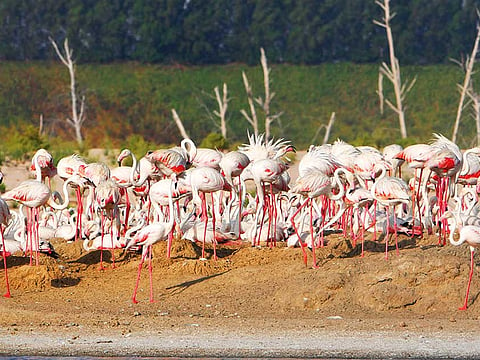Abu Dhabi closes wetland reserve over coronavirus concerns
The Environment Agency has closed Al Wathba Wetland Reserve “until further notice”

Abu Dhabi: The environmental authority in Abu Dhabi has announced the closure of Al Wathba Wetland Reserve – one of the most popular tourist attractions – until further notice.
The Environment Agency in Abu Dhabi (EAAD) said it closed the wetlands to visitors as a precautionary measure to protect the public’s safety from the spread of the coronavirus COVID-19.
The authority clarified that the closure was made following the recent developments of the coronavirus, which has now been classified by the World Health Organization as a pandemic.
The EAAD said that since last November, the wetland reserve received 6,300 visitors. And while access to the tourist attraction is usually closed from May, in order to start the breeding season for flamingos, the EAAD has taken extra measures to prevent large gatherings.
The Ministry of Education had earlier announced that all school trips, activities and events will be suspended as part of precautionary steps to limit the spread of coronavirus.
Dubai's Knowledge and Human Development Authority (KHDA) had also issued a notice calling for the ban of activities such as field trips and gatherings that may comprise students.
In the circular, the authority calls upon all private educational centres, including early learning centres, schools and universities to halt all events and activities between institutions. The memo added that all approvals for pre-planned trips have been cancelled.
Basic protective measures against coronavirus
Maintain social distancing
Maintain at least one metre distance between yourself and anyone who is coughing or sneezing.
Why? When someone coughs or sneezes they spray small liquid droplets from their nose or mouth which may contain virus. If you are too close, you can breathe in the droplets, including the COVID-19 virus if the person coughing has the disease.
Avoid touching eyes, nose and mouth
Why? Hands touch many surfaces and can pick up viruses. Once contaminated, hands can transfer the virus to your eyes, nose or mouth. From there, the virus can enter your body and can make you sick.
Practice respiratory hygiene
Make sure you, and the people around you, follow good respiratory hygiene. This means covering your mouth and nose with your bent elbow or tissue when you cough or sneeze. Then dispose of the used tissue immediately.
Why? Droplets spread virus. By following good respiratory hygiene you protect the people around you from viruses such as cold, flu and COVID-19.
Source: World Health Organization







